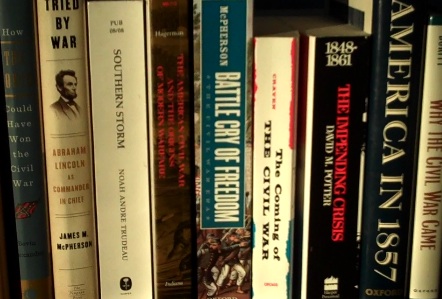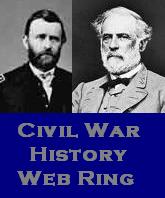On Historiography and Roman Civil War
 I mentioned in an earlier post that I’m taking a course in Historiography this term. I’m heavily into Ernst Breisach’s Historiography: Ancient, Medieval, and Modern.
I mentioned in an earlier post that I’m taking a course in Historiography this term. I’m heavily into Ernst Breisach’s Historiography: Ancient, Medieval, and Modern. So far, the focus has been on the emergence of Greek and Roman historiography and I have a small essay contrasting the two due this weekend. This is the kind of reading that “wets your whistle” (do people still say that?). We are given a glimpse of the broad picture – a sweeping brush across the centuries before the birth of Christ as men began slowly to understand the value of recorded history and commentary. But we are also introduced to bits of information that are hard to not pursue further. Case in point – a Roman civil war that occurred between 88 and 82 B.C. It was fought between the populares (“favoring people”) under Gaius Marius and the optimates (“the best of men”) under Lucius Cornelius Sulla.i
So far, the focus has been on the emergence of Greek and Roman historiography and I have a small essay contrasting the two due this weekend. This is the kind of reading that “wets your whistle” (do people still say that?). We are given a glimpse of the broad picture – a sweeping brush across the centuries before the birth of Christ as men began slowly to understand the value of recorded history and commentary. But we are also introduced to bits of information that are hard to not pursue further. Case in point – a Roman civil war that occurred between 88 and 82 B.C. It was fought between the populares (“favoring people”) under Gaius Marius and the optimates (“the best of men”) under Lucius Cornelius Sulla.i
Romans killed and exiled Romans on a large scale. The Republic lived on as a mere shell in which the ambitions of men like Sulla, Pompey, and eventually Caesar governed events, often to the detriment of the Republic. For the first time Romans became aware that their life differed greatly from that of their ancestors and that the continuity of Roman tradition had been broken. That experience proved extremely disturbing. How did the past, seen as glorious and ideal, fit with the troubled present? Historical and quasi-historical works were written under the spell of this question.ii
What were the issues over which the bloodbath occurred?
-
Land reform
-
The grasping for political power between factions supporting democratic versus republican ideals, and
-
Class disputes.
Hmmm…. I’ll let you draw your own parallels to our own Civil War.
 Of interest, it was Gaius Marius (left) who reformed the Roman Legion by turning it into a professional army open to men of any class. Volunteers signed up for twenty years and the promise of a pension (land grant) and spoils. Soldiering as a profession was born. The allegiance of the legionnaire shifted from country to commanding general as the awarding of a pension was dependent upon the persuasiveness of the general (not by law).
Of interest, it was Gaius Marius (left) who reformed the Roman Legion by turning it into a professional army open to men of any class. Volunteers signed up for twenty years and the promise of a pension (land grant) and spoils. Soldiering as a profession was born. The allegiance of the legionnaire shifted from country to commanding general as the awarding of a pension was dependent upon the persuasiveness of the general (not by law).
I’ll be adding several links to ancient military history…. including several sections in Bill Thayer’s LacusCurtius (good primary sources like Polybius: The Histories). He has also transcribed to the web The Histories of Appian which chronicle the Appian Civil Wars.
Rene
i, ii Breisach, Ernst. Historiography: Ancient, Medieval, and Modern, 2nd Edition. (Chicago: University of Chicago Press, 1994), 52.















































(LacusCurtius with no space — to avoid polluting people’s searches for the actual Lacus Curtius). And yes, in addition to Freeman’s Lee already onsite, I’ll be adding more War Between the States material in 2008. This little note not really meant to spread myself over the Web, by the way, just as a friendly heads-up, you may want to erase it!
Bill Thayer
December 21, 2007 at 1:13 pm
Thanks Bill! It’s great having these primary works available on the web!
Rene
Rene Tyree
December 21, 2007 at 3:11 pm
Rene,
I enjoyed reading this post. BTW, is it “wet one’s appetite” vice “wet (or whet) one’s whistle?” The latter usually means to have an alcoholic drink while the former means to make one wish for more.
Larry
Laurence Freiheit
December 22, 2007 at 1:53 pm
Well said Larry! I should definitely have used “wet one’s appetite!”
Rene
Rene Tyree
December 22, 2007 at 6:23 pm
It would be interesting to apply “inevitability” analysis (often discussed in the context of the American Civil War, as your following post demonstrates) to the fall of the Roman Republic. Certainly the idea that the Republic was “a mere shell” after Marius and Sulla at least strongly implies that the Republic was doomed 50 years before it officially died. Does this not fly in the face of current thinking that generally emphasizes the contingent nature of historical events?
On the more important issue, I’m pretty sure it’s “whet your appetite” and “wet you whistle.”
elektratig
December 23, 2007 at 9:55 am
Very interesting blog. However I think we should be carefull not to use ‘democratic’ and ‘republican’ because these are to easily confused with its modern contemporary meaning.
‘democracy’ only applied to a small group of people, only free men (no slaves, no women) en only citizens of Rome. Thus the italian allies of Rome had the right to march and die for her, but didn’t have the same political rights nor were they entitled to the same pension after serving (showing how narrow teh vision of a ‘democrat’ like Marius could be. See also the Socii Wars, the italian allies were beaten by Sulla and treated with such harshness that they never rose again.
As to the ‘real’ issue at stake, wether it is ‘wet’ or ‘whet’ I can be of no help since I am not a native english speaker.
Just a final note to say that in history as in life nothing is ‘ineveitable’ and that only hindsight always is 20/20.
Karim
Karil
May 3, 2008 at 3:40 pm
Great points Karim. I appreciate your comments.
I believe the “wet” versus “whet” debate was settled by Larry in his comments above – thank goodness.
On inevitability, you may want to visit elektratig’s blog. In addition to insightful comments on a number of issues, he/she (not sure which) addresses often the topic of inevitability. Well worth a visit. The link is on my blogroll.
Thanks for dropping by…
Rene
Rene Tyree
May 3, 2008 at 4:26 pm